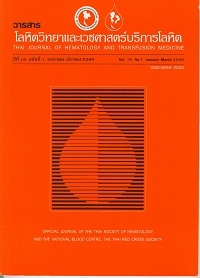ความคุ้มทุนโครงการควบคุมและป้องกันโรคเลือดจางธาลัสซีเมียในหญิงตั้งครรภ์ที่โรงพยาบาลศูนย์สุรินทร์
Keywords:
Thalassemia in pregnancy, Cost-effectivenessAbstract
Abstract:
Objective: To study the cost - effectiveness of prevention and control for thalassemia in pregnant
women project at Surin Hospital. Patients and Methods: Pregnant women with gestational age
less than 16 weeks who visited the antenatal care unit from October 2002 to March 2005. They were
screened by OF (Osmotic Fragility Test) or MCV (Mean Corpusular Volumn) and DCIP (Dichlophenol
- Indophenol Precipitation Test). Among those women with abnormal tests ,their husbans were identified
and screened.If they also had abnormal tests both of them were taken blood samples for confirmed
tests (Hemoglobin typing, %Hb A2, PCR (Polymerase Chain Reaction) at Department of Paediatrics,
Faculty of Medicine, Chiangmai University. The couples at risk of severe thalassemia (Homozygous
β - thalassemia, β - thalassemia / Hemoglobin E and Hemoglobin Bart’s Hydrops fetalis) were advised
to perform prenatal diagnosis (Cordocentesis). Termination of pregnancy was done when the
result of fetal blood were severe thalassemia. The total cost of the project was evaluated and compared
with an estimated cost of the affected babies who would have survived without the project. Results:
5,554 pregnant women were screened, with 3,111 (56%) having an abnormal result. Among those with
abnormal tests, 2,530 (81.3%) husbans were screened. 1,525 husbans (60.2%) had abnormal test result.
Prenatal diagnosis of thalassemia was performed in 48 pregnant women. Eight fetuses had severe
thalassemia and 6 of these pregnancies were terminated. The total cost of the project was 694,490 baht
compared with an estimated cost of 891,000 baht for 5 cases that would have survived without the
project (77.9%). Summary: This project is cost - effective but should have the saved and suitable
screening methods for this area.



